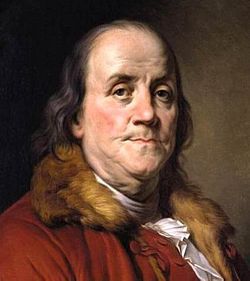Thursday

"[T]here has always been a conflict between power-seeking moral reformers and the 'lowbrow' culture of saloons, immigrant and black resistance to work, shopping, dance halls, rock-and-roll, and the ever-advancing sexual revolution." That's Thaddeus Russell, writing in his splendid A Renegade History of the United States.
The more I read about American history, the more I realize he's right. But it hasn't just been a conflict between the industrious and the slovenly. It's also been a war between debtors and creditors, agriculture and manufacturing, and other diverse ways of thinking and living. While growing up, I had always believed in the American way. In my vision of the American way, laziness and bankruptcy and atheism were anathema. The real American worked hard, saved, and attended church: a Benjamin Franklin-ite, without his sexual deviancy. Alas, it's simply not true. America has always been conflicted among various classes. The Scot-Irish of the western frontier had little in common with the proper English of Boston, who had little in common with the cavaliers of Virginia.
The Franklin-ite vision of America took a big step forward with the ratification of the Constitution. Through it, the manufacturing and entrepreneurial classes were able to get tariffs to protect their industries and eliminate (at least cripple) the ability of debtors to get out of their debts through bankruptcy or the use of cheap paper money. Farmers and debtors and the immoral suffered a setback in 1789, but they never went away and never stopped agitating. They would rise again, a little bit with Jefferson, a lot with Jackson, and then win the day in the twentieth century as the upper-classes forged a bond with the poorest classes in an effort to squeeze the biggest class (middle). Agriculture subsidies are the norm; bankruptcy laws are the most-liberal in the word; paper money debases creditors' positions. In the meantime, the richest in NYC get richer as primary dealers of the Federal Reserve, insider trading, bailouts, and other salves from the same people who hand out salves to the lower classes: Washington, DC.
